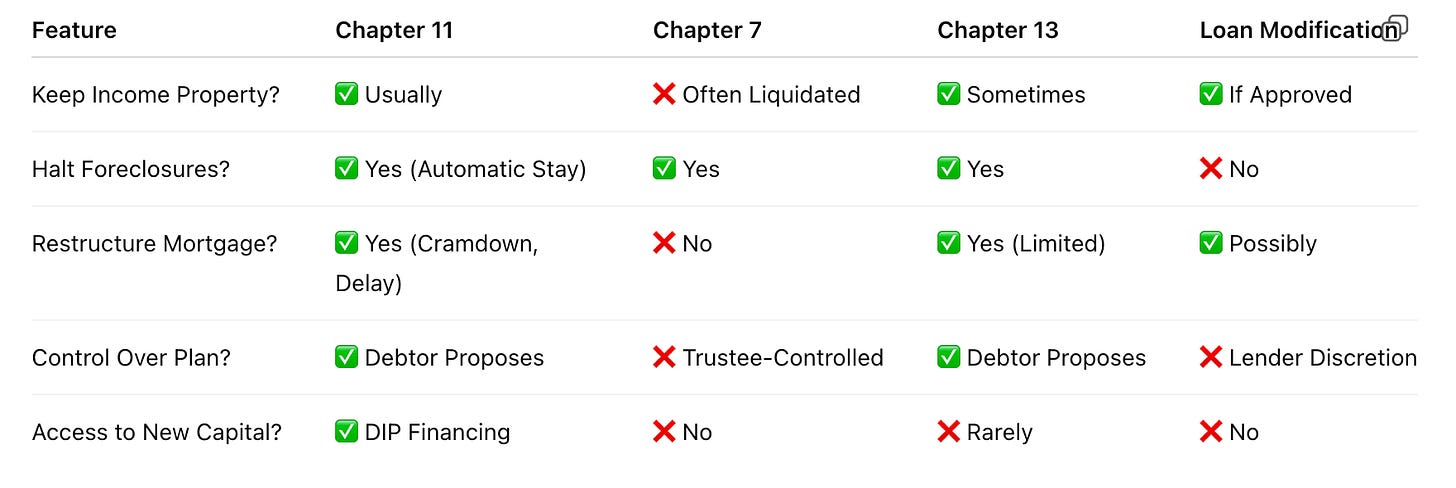Why Chapter 11 Is a Smart Move for Real Estate Investors
When people hear the word “bankruptcy,” they often associate it with failure, foreclosure, or the end of a financial road. But for savvy real estate investors, Chapter 11 bankruptcy isn’t a sign of defeat—it’s a strategic legal tool to restructure debts, protect valuable assets, and reposition portfolios for long-term growth.
In this blog, we’ll explore why Chapter 11 is not only a lifeline but also a powerful business move for real estate investors. We’ll cover how it works, key benefits, practical use cases, and examples of how it has been used to rebound from financial distress stronger than before.
What Is Chapter 11 Bankruptcy?
Chapter 11 is a reorganization bankruptcy, primarily used by businesses but also available to individuals with substantial assets and liabilities. Unlike Chapter 7 (which liquidates assets) or Chapter 13 (for wage earners), Chapter 11 allows a debtor to continue operating while restructuring debts.
For real estate investors, Chapter 11 provides a way to keep income-producing properties, renegotiate mortgage terms, and avoid fire sales of assets.
Why Real Estate Investors Choose Chapter 11
1. Preserve Income-Generating Properties
One of the most significant advantages of Chapter 11 is that it prevents creditors from immediately foreclosing on properties. This is vital for investors who depend on rental income.
Once a Chapter 11 petition is filed, the automatic stay provision kicks in. This legal shield halts foreclosure proceedings, lawsuits, and collection efforts, giving the debtor breathing room to reorganize their affairs.
This time can be used to stabilize cash flow, raise rents, reduce expenses, or sell underperforming assets under better market conditions.
2. Cramdown Power Over Secured Debt
Chapter 11 gives investors powerful leverage over lenders through what’s known as a cramdown.
If a property is underwater (i.e., the mortgage exceeds the property’s value), the court may allow the debtor to strip downthe debt to the current market value of the asset. The excess becomes unsecured and can be discharged or repaid at a fraction of the original terms.
For example, if an investor owes $1.5 million on a property now worth $1 million, Chapter 11 may allow the mortgage to be restructured to $1 million, with the balance treated as unsecured debt.
3. Reject or Renegotiate Burdensome Leases and Contracts
Chapter 11 allows the debtor to assume or reject executory contracts. If an investor is locked into a costly management agreement, unfavorable lease, or overpriced vendor deal, they can use Chapter 11 to cancel or renegotiate those terms.
This flexibility is particularly valuable when managing multiple commercial properties or portfolios with third-party obligations that are no longer viable in a changed market.
4. Access to DIP Financing
Debtors in Chapter 11 may obtain Debtor-in-Possession (DIP) financing, which is often prioritized above pre-bankruptcy debts. Lenders are more willing to provide financing when they know it comes with priority status, often approved by the bankruptcy court.
For real estate investors, this means potential access to capital to make repairs, improve cash flow, or seize new acquisition opportunities even while in bankruptcy.
5. Time to Sell or Reorganize Strategically
Without the pressure of creditors banging on the door, investors can take the time to analyze their portfolios and dispose of underperforming assets in a controlled, tax-advantageous way.
This may involve:
Selling properties over time rather than in a panic
Restructuring ownership entities (LLCs or trusts)
Converting short-term debt to long-term fixed-rate loans
Merging or consolidating real estate holdings
Chapter 11 provides the opportunity to rebuild, not retreat.
Ideal Scenarios for Using Chapter 11 in Real Estate
🏘️ Portfolio of Rental Properties in Distress
An investor with several rental homes or apartment buildings facing foreclosure due to rising interest rates or tenant delinquencies may use Chapter 11 to restructure loans while continuing to collect rent.
🏢 Commercial Property with Declining Revenue
Office buildings, hotels, or retail centers hit by economic downturns may struggle to meet loan covenants. Chapter 11 offers a way to retain control, work with creditors, and renegotiate financing terms.
🏗️ Development Projects Gone Sideways
If construction delays, permit issues, or funding shortfalls stall a project, Chapter 11 can halt lawsuits, buy time, and secure new capital or partners.
🤝 Partnership Disputes
If co-owners disagree or a joint venture falls apart, Chapter 11 can be used to freeze the situation, resolve claims, and propose a fair exit or buyout strategy through the court-supervised plan.
Chapter 11 vs. Alternatives
Misconceptions About Chapter 11
❌ “It’s Too Expensive.”
While legal and administrative costs can be high, the value preserved—in terms of property, income, and long-term solvency—often far outweighs the expense. Also, Subchapter V (for smaller businesses or individual investors) has streamlined procedures and reduced costs.
❌ “It Will Ruin My Credit.”
Bankruptcy does impact credit scores, but so do missed payments, foreclosure judgments, and loan defaults. Chapter 11 is seen as a responsible effort to reorganize, and many lenders will still work with investors post-bankruptcy.
❌ “I’ll Lose Everything.”
On the contrary, Chapter 11 is designed to protect assets. Unlike liquidation, it empowers debtors to negotiate and manage their way back to solvency.
Success Stories: How Investors Rebounded
🏨 A Hotel Chain Saved Through Cramdown
A mid-size hotel operator facing $20M in secured debt across 5 properties filed Chapter 11 after pandemic shutdowns destroyed revenue. Through cramdown, they restructured three underwater loans, sold one non-performing asset, and kept the remaining properties operating profitably.
🏘️ Multifamily Landlord Avoided Fire Sale
An investor with 10 apartment complexes filed Chapter 11 after falling behind on payments due to vacancies and rate hikes. Chapter 11 let him stabilize operations, negotiate new leases, and sell only two properties to satisfy creditor demands—while preserving the rest of the portfolio.
🏗️ Development Project Restarted With DIP Financing
A real estate developer used Chapter 11 to stop litigation from contractors, reject bad subcontractor agreements, and secure $3M in DIP financing to complete a delayed condo project. He later exited bankruptcy with 85% ownership intact.
Tips for Investors Considering Chapter 11
Hire Experienced Counsel: Work with a bankruptcy attorney who understands real estate, not just general corporate law.
Document Your Business Plan: Courts and creditors want to see a roadmap for recovery. Have cash flow projections, valuation reports, and asset lists ready.
Engage with Creditors Early: Negotiations often start before filing. Transparent communication builds trust.
Know Your Numbers: Understand which assets are worth saving and which can be sold or surrendered.
Time Your Filing Strategically: Filing too early may waste resources; too late may result in foreclosure or lawsuits. The right timing is key.
Subchapter V: A Faster, Cheaper Chapter 11
For individuals and small real estate entities with less than $7.5 million in debt (as of 2025), Subchapter V of Chapter 11 provides a simplified process:
No need for a creditor committee
Faster confirmation timelines
No disclosure statement required
Trustee assists but does not take over
This makes Chapter 11 even more accessible to landlords, flippers, and developers working at smaller scales.
Final Thoughts: Chapter 11 Is a Business Tool, Not a Scarlet Letter
In real estate, market cycles, tenant turnover, interest rate hikes, and economic shocks are part of the game. The smartest investors don’t avoid risk—they manage it strategically.
Chapter 11 bankruptcy isn’t a sign of failure—it’s a sign of foresight, resilience, and tactical thinking. It’s how real estate professionals reclaim control, protect equity, and reposition for the next phase of growth.
For those holding valuable properties but caught in temporary distress, Chapter 11 may just be the smartest move you can make.
By Rafael Benavente
Legal Record Update:
The case Decimal Capital Partners LLC vs Rafael Benavente, filed under number 2023-018206-CA-01, appears on multiple aggregator sites such as Trellis.law. This blog addresses what’s often missing in those listings—context, resolution, and the reality behind the legal headlines.




